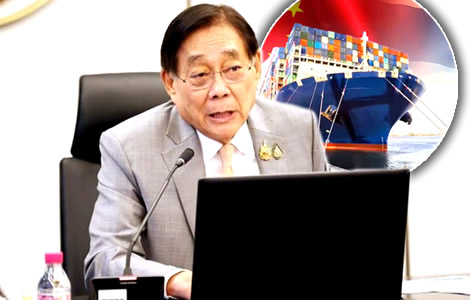Thailand pushes the U.S. for tariff parity as a 36% tariff deadline nears. Facing stronger neighbours’ deals, an expected slowdown in exports and border war, Bangkok responds to U.S. questions and vows to crack down on Chinese transshipments to protect its trade and security.
Thailand is stepping up its push for a comprehensive tariff deal with the United States. On Thursday, the Finance Minister met U.S. trade negotiators online, pressing for zero-tariff access for American goods and cracking down on Chinese transshipments. At the same time, a military assault from Cambodia sent a clear message: Thailand stands alone in the region. It’s a wake-up call to put national interests first—on trade, on security and on every front that matters.

On Thursday, Thai Finance Minister Pichai Chunhavajira held consultations with U.S. Trade Representatives in Washington, D.C. The meeting was part of Thailand’s ongoing effort to secure improved tariff conditions for its exports to the United States. Pichai led a delegation that responded to a series of questions raised by U.S. officials.
He clarified that Thailand had not made any new proposals during the talks. “Don’t call it an additional proposal. It’s just a response to what the U.S. has offered,” he said. The Thai side presented no fresh terms or offers, only clarifications and answers related to an earlier submission.
Thailand’s primary aim is to achieve tariff parity with regional peers. Officials are hoping for a U.S. tariff rate not exceeding 20%, similar to the level granted to Vietnam. Pichai noted that expectations were based on achieving rates that would keep Thailand competitive in the region.
Thailand holds firm in U.S. trade talks with new proposals as it pushes for fairer regional tariff parity
When asked whether Thailand’s reciprocal tariffs from the U.S. would be as favourable as those received by other ASEAN countries, Pichai said he remained hopeful. “As a working person, we must have that kind of hope anyway,” he told reporters.
Earlier statements from the Ministry of Finance confirmed that Thailand was seeking treatment aligned with the U.S. trade and tariff framework, which emphasises regional consistency. This approach would ensure administrative efficiency and fairness across Asia.
The stakes are high. Without a deal, Thailand faces a 36% tariff on exports to the U.S. beginning August 1. Such a tariff would likely damage key Thai industries and further slow already pressured export performance.
Recent economic indicators and projections underline the urgency. Nonetheless, on Thursday, the Commerce Ministry reported that Thai exports rose 15.5% in June compared to the same month last year. The result fell short of the 18.7% increase forecast by economists. May exports had risen by 18.4%.
Urgency grows as 36% tariff looms and Thai export performance continues to lag behind
Imports in June also came in lower than expected, rising 13.1% compared to a projected 17.75%. The trade balance showed a surplus of ฿1.06 billion, slightly above the expected ฿0.6 billion.
For the first half of 2025, Thai exports rose 15.0% year-on-year, while imports grew 11.6%. Exports remain a crucial driver of Thailand’s economy, contributing significantly to GDP growth.
However, the strength of the Thai baht is eroding export competitiveness. Poonpong Naiyanapakorn, head of the Trade Policy and Strategy Office, said rice shipments have been especially affected. He warned that tariffs imposed by the U.S. could become a central factor in slowing export growth during the second half of the year.
Washington has recently struck new tariff agreements with other regional economies, raising pressure on Thailand to secure similar terms. In the past two days, Japan finalised a deal giving it a 15% tariff rate. Indonesia reached a 19% rate earlier, followed by the Philippines this week. Vietnam already enjoys a 20% rate.
Strong baht and falling competitiveness add pressure as neighbours strike better tariff deals with U.S.
Thailand is seeking to enter this group. Achieving parity would help maintain market access and competitiveness in the U.S. market, especially as regional neighbours gain advantages under the current American trade strategy.
A key issue in the negotiations is the matter of Chinese transshipments. The U.S. has expressed concern that Chinese goods are being routed through Thailand and other countries to bypass tariffs. This practice, which emerged during the U.S.–China trade war that began in 2017, is viewed as a loophole.
To address this, Thai authorities may be required to enforce stricter customs measures. These would include monitoring goods for origin and enhancing port security to verify the source of exports. Analysts believe that demonstrating the ability to halt this practice could unlock more favourable tariff terms.
“Robust enforcement against transshipment is essential,” said one Bangkok-based trade policy advisor. “It’s the price of admission if Thailand wants to be treated like Vietnam or Indonesia.”
US trade officials are also interested in tying down offers of Thai investments in addition to agricultural, energy, and aircraft purchases put on the table by Thailand.
U.S. demands Thailand clamp down on Chinese transshipments in return for regional tariff equal footing
The talks also come at a time of renewed concern over national security. In the past 24 hours, coordinated attacks in Thailand’s eastern border provinces, launched by Cambodia, have raised alarm in Bangkok. The military is still responding, but the flare-up of hostilities has led to mass evacuations and significant casualties.
14 killed and over 100,000 evacuated as the army brings in more guns trained on Cambodian border forces
The Thai government sees these developments as a reminder that it must remain self-reliant in defending the kingdom. But it may also come to view stronger U.S. ties as a potential benefit. Defence cooperation with the U.S. has remained a pillar of Thailand’s national strategy as a military ally for decades.
The current geopolitical environment, including increased tensions in the Asia-Pacific, is influencing Thai thinking. A deeper economic and security partnership with the U.S. could offer long-term advantages.
Trade officials say they are working within a tight window. With the August 1 tariff deadline looming, there is little time left to finalise a deal. Thai negotiators are expected to continue pressing for parity with regional peers over the coming days.
Cross-border violence and U.S. deadline fuel urgency as Bangkok weighs trade and security alignment
The government hopes its efforts will result in a fair outcome. A failure to secure lower tariffs could dampen investor sentiment and affect overall economic performance in the latter half of 2025.
Thailand’s position remains focused and clear. The country wants treatment that reflects its role in the regional economy. It seeks to avoid being placed at a disadvantage as the U.S. sets its trade terms across Asia.
Thailand makes last ditch effort to get a winning tariff deal with the U.S. Final counteroffer to Washington
Hardboiled US negotiators exposing Thailand’s policy double talk. A trade deal inferior to Vietnam is likely
Thaksin lifts morale of followers as US deal is in the works with a final rate close to that of Vietnam
As negotiations proceed, both sides are expected to hold additional technical discussions. While no major breakthroughs were announced on Thursday, Thai officials remain cautiously optimistic.
The outcome will shape the trajectory of Thai-U.S. trade relations for years to come.


















